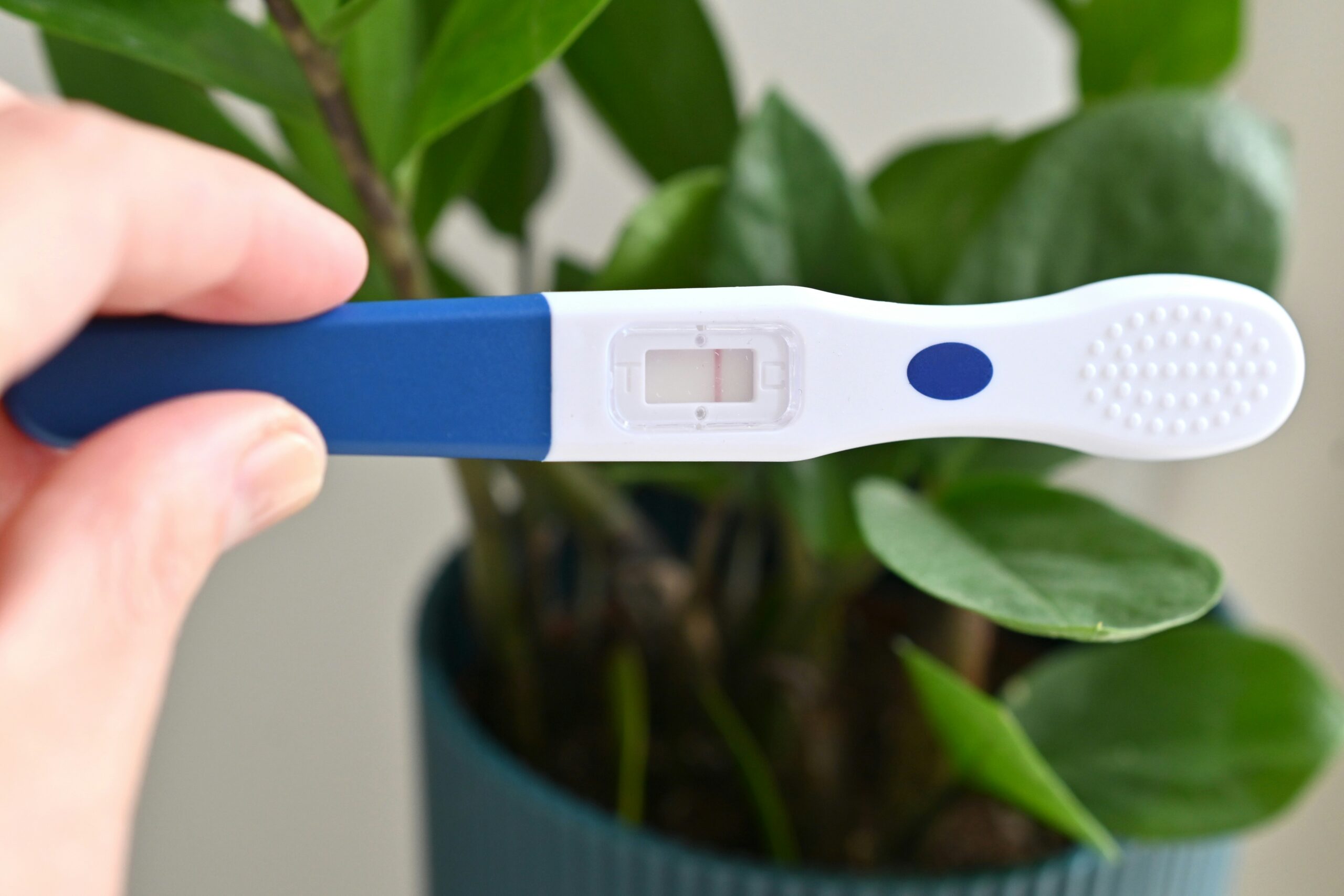My six-year battle with infertility ended one Monday in November when I gave birth to my son Malachi at 5:19 pm followed by my daughter Amalia at 5:20 pm. It was also the end of 37 straight weeks of anxiety.
I always wanted to be a mom, and I really did always dream of having twins. But, in those two minutes, my dream came true and I became an entirely different person in a way I didn’t anticipate.
I spent almost all of my 30s working on becoming a mom. It took constant physical stamina, emotional bandwidth and every penny we had—and even those we didn’t. Of course, no one ever plans on infertility—my husband Isaac and I thought the road would be straightforward and quick (doesn’t everyone?).
Our journey to parenthood began on a romantic trip to Italy two years into our marriage. We had friends who struggled to conceive and always felt grateful that our story would be different. We just had a naive feeling that it would happen easily for us.
I ran around Italy with ovulation tests, peeing on sticks and setting timers at fancy museums and vineyards. By the plane ride home, my husband Isaac was convinced that we were pregnant—that it had happened on the first try. Two weeks later, when our first “not pregnant” appeared on the stick, Isaac said, “OK, here begins our journey.” And he was right, it did begin our journey, but little did we know what that would entail.
Eventually, we started with the gateway fertility treatment: intrauterine insemination (IUI), a procedure that—minimally—boosts your chances of conception by a doctor actually inserting sperm via catheter inside the uterus, coupled with an exact time of ovulation for maximum efficiency. Too many IUIs later (four procedures in four months,each with more intense drugs) and no pregnancy to speak of, our dreaded IVF journey began.
Hearing the words “IVF” (in vitro fertilization) upped all stakes. Our emotions soared, everything felt important, precious, delicate, intense, and expensive. It added stress to our marriage, as is to be expected. It felt like everything about Isaac had to be perfect—even more perfect than usual—because, if it wasn’t perfect, why were we going through this insane effort and financial strain to procreate with each other anyway?
In addition to all the interventions on the medical front, I tried all sorts of Eastern medicine-inspired boosters:diet tips, teas, Chinese herbs, you name it. I’d started going to acupuncture as the first line of what I call “oomie goomie” (new age, woo-woo — you get the idea) help.
My acupuncturist put me on a super strict eating plan: no gluten, no dairy, no sugar, no nightshades.. I followed the diet to a T save for wine, which I considered a fruit. I felt great, actually. It wasn’t easy, but I actually think following this insane regimen kept me feeling balanced, healthy, and thin in the face of all those hormone shots. Of course, I’d have traded it all for a pregnancy, but the bottom line is that my life was consumed with this one primary focus.
Having unexplained infertility is like waking up every day in a state of grief.
There’s a part of your heart that permanently pangs with sadness and sometimes anger, a sense of void, and also sometimes a teeny bit of hope. I’d be hopeful for treatment, but then I’d face another round of such debilitating heartbreak that I’d need to take a break. Infertility took its toll on us, of course. And it made me think about things I didn’t want to think: Why was God doing this to us? What lessons were we supposed to learn? Why did I feel so strongly that I was meant to be a mother when clearly I wasn’t?
How could I keep going? How could I not? These were my thoughts for almost all of my 30s.
There were a few signs of hope along the way. On my third transfer we received our first BFP (this is infertility speak for “big fat positive,” as in a positive pregnancy test). We were so relieved—this hell was finally over. We did all the things, it took longer than we wanted, but we could finally begin to imagine the dream family life we’d planned for. Until we couldn’t.
It never occurred to me that this wouldn’t be a viable pregnancy. I didn’t even consider it in the slightest realm of possibilities. We were in great hands, healthy, at a great clinic, we did everything “right” and we’d had enough suffering. When we heard the dreaded “there’s no heartbeat,” I was of course in a state of sadness and grief, but I was honestly mostly shocked—how could this also be added to our story? I was not prepared.
I was also surprised at what it actually felt like to experience a miscarriage. In my head: you’re pregnant and maybe you feel a gush of blood, or maybe one single cramp, then you see a doctor, you have a procedure, and then it’s over.
I imagined it quick and finite, a before and after that may happen on the same day. In reality, that’s nothing like the pregnancy loss experience.
We waited. We waited a long time to officially “miscarry.” There is a special kind of torture—when you yearn to be a parent—in waiting to become unpregnant. Blood levels are constantly checked, and decisions need to be made about treatment protocols and options. Each option given provides a new slew of triggers, questions, and heartache. Each day of waiting to finally, hopefully, start over adds torment to your emotions. This was the first of three losses we experienced—and they never got easier or less painful.
What we didn’t expect was the way it would take a toll on our other relationships. We had friends who knew what we were going through, but, in trying to be polite and respectful to us, never once checked in on us or asked how we were. It became awkward, sometimes, and isolating often. Even with some of our closest friends and family, we didn’t know how to share our grief and didn’t always feel the support we needed when we did share.
All of the complicated feelings we were carrying needed somewhere to go. This is why Isaac and I started our first podcast. The microphone became a sort of default therapist to help us share our innermost thoughts and feelings.
I am painting the picture because I was in such a bad “way” for so many years that it became a part of who I am. It isn’t to say that I was all Debbie Downer all the time. I wasn’t. But I became the token infertile friend.People were scared to share their pregnancy announcements with me, and I don’t blame them. Sometimes I’d cry right then and there and run into the bathroom. But also, if people hid it from me to protect me, I’d feel awful as well like I was kryptonite to their joy— it was a perpetual no-win situation.
Yes, this long, winding road has a happy (miraculous, incredible, dream) ending. It was lucky number eight that did it for us. Yup, four IUIs, four egg retrievals, and eight IVF transfers. This was really going to be our final, final, final round. We were exploring surrogacy.
And then our literal miracle.
It was an uneventful pregnancy, though I can’t call it easy. The anxiety of pregnancy after loss, pregnancy after infertility, twin pregnancy, and geriatric pregnancy (thanks medical world) is no joke. It was a constant cycle of waiting for the proverbial shoe to drop. I didn’t even truly believe I was pregnant until about twenty-eight weeks….that’s how deeply the infertility trauma was embedded.
Once I emerged on the other side of infertility, I literally felt gobsmacked. I wondered and worried about what each and every day of my pregnancy would look like, so much so that I never spent one moment thinking about what life as a mother might be like.
We all go through a major transformation when we are thrust into motherhood. But I found it harder to figure out who I was without my infertility story, than who I was as the responsible party for two humans.
I was shocked to learn that even after working for six years to get my babies here, I was not actually interested in staying home with them every day. I was also shocked that they made me crazy and really tired sometimes.
In my pre-mom infertile head, it was as if the usual mom complaints and points of exhaustion would pass over me since I wanted them more than anything else in the world—but it turns out that sleep deprivation is sleep deprivation, no matter how badly we negotiated to stay up all night if we “could just have our baby…”
Family and friends were asking me if I’d made any “mom friends,” and I discovered that I had a whole new set of triggers. Yes, I was in the baby classes and therefore was making friends who also had infants, but many of these women identified as mothers first. I wasn’t there yet and didn’t consider myself a mom-friend to anyone. I was still the infertile friend.
In recording my infertility podcast with my husband, Isaac, I felt like I became a (self-appointed) voice for women everywhere who couldn’t have babies and didn’t have a space to talk about it. There are so many mom podcasts, mom blogs, and “here’s what to do with your kids this weekend” articles, but where was the place for brokenhearted people who want to be parents but aren’t? We wanted to provide support and solidarity for these couples.
So for all these reasons, my entrance into motherhood left me with an extra dose of survivor’s guilt. I still wanted to be a warrior for this under-served population of women and couples, and I felt almost uncomfortable telling folks in that community I was pregnant because I knew so well the twinge of pain they were feeling. I felt in some strange way that I was betraying them, like I’d been kicked off my team but to the team we all wanted to be on.
Even now as my kids are growing and I am unquestionably into the mom phase, I can’t seem to separate from my infertility identity. And what I am slowly learning is that it’s OK. We are sometimes made to feel like we have to get past these tough phases of our lives – we hear things like “it won’t be forever,” or “once your babies are here you won’t remember all you went through.” I remember everything I went through, and I am not willing to let go of it,so instead I am finding ways to integrate it into my life each and every day in each and every way.
I never thought I’d get pregnant. And even though it took such a long time for me to become a mother, and I still am not sure all that it means—half the time I look at Malachi and Amalia and can’t even wrap my head around the fact that they’re here with me on earth.
Read more powerful essays and narratives on Miscarriage Movement.
Author
-

When Abbe emerged on the other side of her own infertility battle, she founded InCircle Fertility to hold the hearts and hands of those struggling to build their families. She bridges the gaps between the clinic, doctor, patient, and therapist experiences and knew there was a niche to provide support from someone who’s been there - literally everywhere. Abbe has a background in Behavioral Science and is a Certified Life Coach. She is an avid mahjong and card player, an escape room enthusiast, and has been called by many friends a true ""balabusta."" Abbe is married to filmmaker Isaac Feder (they are a true Hollywood cliche), and they live in Los Angeles with their miracle twins.
View all posts





